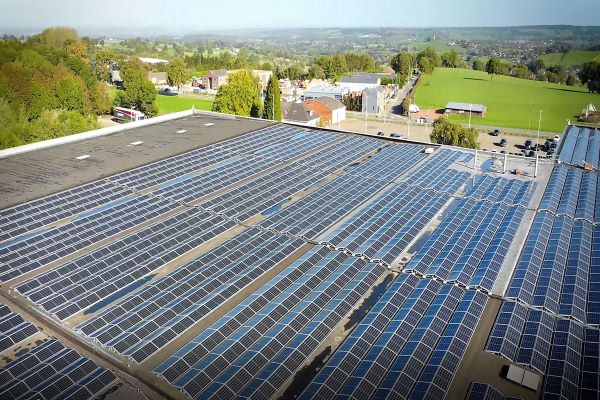The glass fiber industry has set itself the ambitious goal of becoming climate-neutral by 2050

Photovoltaic panels on the roof of the 3B production facility for sustainable on-site electricity generation. Pic: BASF
BASF, the world's leading chemical company, has set itself the ambitious goal of reducing its Scope 3.1 emissions by 15% across its entire portfolio by 2030 and achieving net zero by 2050. This is only possible by procuring raw materials with reliable PCF (Product Carbon Footprint) primary data and, furthermore, raw materials with a reduced PCF.
One of the first steps is the partial use of glass fibers from sustainable production in BASF’s Ultramid A & B compound portfolio. These glass fibers are produced by 3B Fibreglass, a leading company and supplier of glass fiber solutions for the reinforcement of thermoplastic and thermoset polymers. To reduce its carbon footprint, it uses green electricity in production.
“Over the years, 3B has put a lot of effort into reducing its carbon footprint, as part of our sustainability strategy and commitment to becoming carbon neutral. In addition to technical innovations within our processes, we have introduced more and more renewables in our mix. At our Battice site in Belgium, we have installed solar panels for the direct production of electricity and have green energy purchasing agreements in place. This enables the company to significantly reduce its carbon emissions, thus helping to reduce the carbon footprint throughout the value chain,” Ludovic Piraux, 3B CEO, explains.
The glass fiber industry has set itself the ambitious goal of becoming climate-neutral by 2050. By producing glass fibers with green electricity from January 1, 2024, 3B is taking a big step in the right direction. Much like on the mass balance principle, the green electricity used in production is attributed to BASF's glass fiber products.
By using such sustainably produced glass fiber, the PCF of BASF glass fiber reinforced products can be reduced by about 10%, corresponding to savings of about 5000 metric tons of carbon per year. This equates to the annual emissions of 200 average German households.
“BASF has emerged as a frontrunner in the sustainability sector by taking multiple measures. By using glass fibers produced by 3B with green electricity, BASF is underlining its commitment to mitigating climate change. Furthermore, this is one more step in reducing BASF’s Scope 3.1 emissions. BASF's use of glass fibers in various durable applications also contributes to sustainability in the customer industries, as Ultramid compounds are especially valued for their durability, strength and versatility. This example marks another milestone on our plastics journey toward a more sustainable future,” says Maximilian Lehenmeier, Sustainability Expert at BASF.
Subscribe to our newsletter & stay updated.